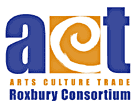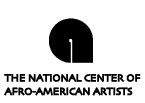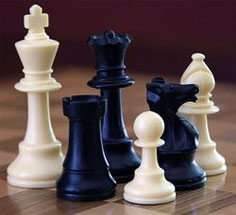D.C. area’s black residents make chess their game
FORESTVILLE, Md. — It’s 9 o’clock on a Friday night at a Starbucks in Forestville, and Robb Peterbark is glaring across the chessboard at his opponent.
“You better take Barbaro while you got the chance. If not, he’s gonna get you,” Peterbark snarls, referring to a knight he has named after the Kentucky Derby winner.
Across the board, Dwight Dawson frowns as he contemplates his next move.
“This game was supposed to be over a half-hour ago,” Peterbark exclaims, sighing loudly. “Can I get you to consider making this move sometime today? How about just sometime this side of eternity?”
Dawson snatches up the knight. Peterbark grabs his chest.
“You took Barbaro!” he said. “That’s all right! Secretariat is still gonna get you!”
It’s three hours into the Forestville Chess Club’s weekly chess binge that starts every Friday afternoon at Starbucks, then moves down the block to the International House of Pancakes, where players compete until sunup. It picks up the next afternoon at Borders bookstore in Largo, often followed by hours playing at one another’s homes.
Many consider the Washington area a hub of black chess: Two of the first African American men to achieve the rank of chess master came from here, and Dupont Circle offers a classic chess scene for African Americans and others, with players ringing the park as men in suits competing with street hustlers. Thousands more, including many blacks, gather to play — from Potomac Mills in Woodbridge, Va., to D.C.’s Anacostia neighborhood, to Columbia Mall in Maryland.
And they’re not playing Bobby Fischer’s brand of chess, either.
“Black chess is not like European chess, where everybody sits there all quiet and doesn’t say anything,” said player Nathan Saunders, 42, general vice president of the Washington Teachers’ Union. “Black folks talk trash. You gotta have that sass to go along with the game. As a matter of fact, a lot of guys will ask each other as they sit down, ‘Are we going to play European chess or chess from the ’hood?”’
Many of them play speed chess — on a timer — and bet. “That’s how a lot of the park players make their living,” said Eugene Brown, 60, founder of the Big Chair Chess Club in Deanwood, a neighborhood in Northeast Washington. “They call it ‘fishing in the park.’”
It’s not lost on some players that white moves first, Brown said; in fact, it’s a life lesson.
“You’ve got to take the initiative, no matter that someone else has it first,” said Brown, who is producing a documentary on the region’s black chess scene. “All that ‘white moves first, white people do this and white people do that’ — that is only an excuse, and if you give a chess player an excuse, they are more likely to fail. That’s the same in life.”
Whether drawn by the philosophical or by the pure strategic challenge of the game, the players are as varied as the venues. The Forestville and Largo clubs include teachers, IT specialists, musicians, business owners and a court commissioner. Despite his busy schedule in Annapolis, Sen. Ulysses Currie, D-Prince George’s County, turned out for a Saturday game at Borders.
Currie said he learned to play chess when he was in graduate school at Howard University. When the legislature is not in session, he plays several times a week. While in Annapolis, he tries to get in at least one game a week — sometimes with Del. Kumar P. Barve, D-Montgomery, the majority leader, or Maryland Sen. Jamin B. Raskin, D-Montgomery.
Last year, Currie pushed through a measure that provided $200,000 to develop chess programs through schools and nonprofit organizations, and he is working with the University of Maryland Baltimore County’s top-ranked chess team and state education officials to identify organizations for funding.
As he worked in committee meetings one recent day, he took time during his breaks to bone up on his game by studying a book of chess moves.
“Chess defines us in ways other than the way we are often defined in newspapers and on television with the negative images,” he said of African Americans. “Chess knocks the stereotypes and shows that we are intellectual, cerebral people and that we are interested in something other than basketball.”
Kevin McPherson, 31, a federal government personnel security specialist who lives in Laurel, Md., was also at Borders for chess. McPherson learned chess at age 5 from his father and is so hooked that he competes with other players about three times a week, plays on the computer three or four days a week and reads books on chess strategy constantly.
Also there was Vincent “Red” Meredith, 56, an IT specialist from College Park, Md., who picked up the game from co-workers at the Justice Department 20 years ago. So was Anthony “Little Man” Walker, 34, a used car salesman from Bowie, Md., who learned chess while doing time for drug conspiracy.
Brown also honed his chess skills in prison. He learned to play against the backdrop of the civil rights movement. He was a teenager hanging out in Southeast Washington, embracing black power, when his cousin began giving him lessons.
“The mood back then among most blacks was that they wanted to become enlightened about their history and their rights,” he said. “Everybody was reading and learning. Chess was a part of all that.”
In 1968, the Rev. Martin Luther King Jr. was assassinated, and Brown, then 21 and disillusioned, turned to heroin. After being convicted of bank robbery and theft, he spent 15 years in prison.
“There were the brothers who embraced the various programs, the brothers who embraced the Bible and the brothers who embraced chess — and I was one of them,” he said.
For eight hours a day or more, he played, gleaning such life lessons as “Always think before you move” and “Understand that you are responsible for every move you make.”
After he got out, Brown used chess to help youngsters, teaching them at the Deanwood Chess House. He taxis students to tournaments in the Chess Mobile, a dark blue 1984 Lincoln Continental limousine adorned with shiny chrome rims on the outside and chessboards inside.
“I teach them that the best chess players are the ones who make the best decisions,” he said.
The rich tradition of black chess reflects the profusion of good players the region has produced: The first nationally recognized black player, Theophilus Augustus Thompson, was born in 1855 in the Maryland city of Frederick, according to www.thechessdrum.net, a Web site that spotlights African American contributions to the game. Thompson learned the game while working for the publisher of a chess magazine.
The first African American to achieve the title of chess master, based on points accrued in tournament play, was Walter Harris, a scientist at the U.S. Naval Observatory. Other local chess notables include Frank Street Jr., winner of the U.S. Amateur Championship in 1965 and a chess master; Charles Covington, a noted pianist and chess player from Baltimore; and Kenneth Clayton, who long tutored chess at the Benjamin Banneker recreation center on Georgia Avenue NW in D.C.
“A lot of heroes and legends of the game ... play in this area,” said chess master William Morrison, a teacher from Baltimore known as “The Exterminator.”
Interest in chess skyrocketed among African Americans after Maurice Ashley of New York was named the first black grand master in 1999, said James Taylor (a.k.a. “The Black Knight”), director of the Chess University, a D.C.-based nonprofit organization that works to develop black chess talent.
But African Americans are underrepresented at the top because they lack sponsorship to pay expenses to travel to larger tournaments, said Ted Fagan, founder of the Forestville and Largo chess clubs.
Back at Starbucks that Friday, Peterbark and Dawson were exceedingly cautious, knowing that the other player would capitalize on any mistake. There is a long rivalry between the men, and each game builds on it. Peterbark says he’s won the most games. Dawson, of course, disagrees.
“He’s no competition for me,” Dawson said. “I just play him for something to do.”
They had been at it for more than an hour when the Starbucks manager notified them it was time to fold up their boards. With less than five minutes to go, Peterbark got a break. He attacked Dawson’s queen with a rook. Dawson answered by taking Peterbark’s pawn. Inadvertently, though, he failed to protect his king.
“The final curtain! The party is over!” Peterbark shouted, raising his hands in victory.
“That was luck,” one observer offered.
“That wasn’t luck; that was skill!” Peterbark said, collecting his things to move down to IHOP.
(The Washington Post)
|
|







